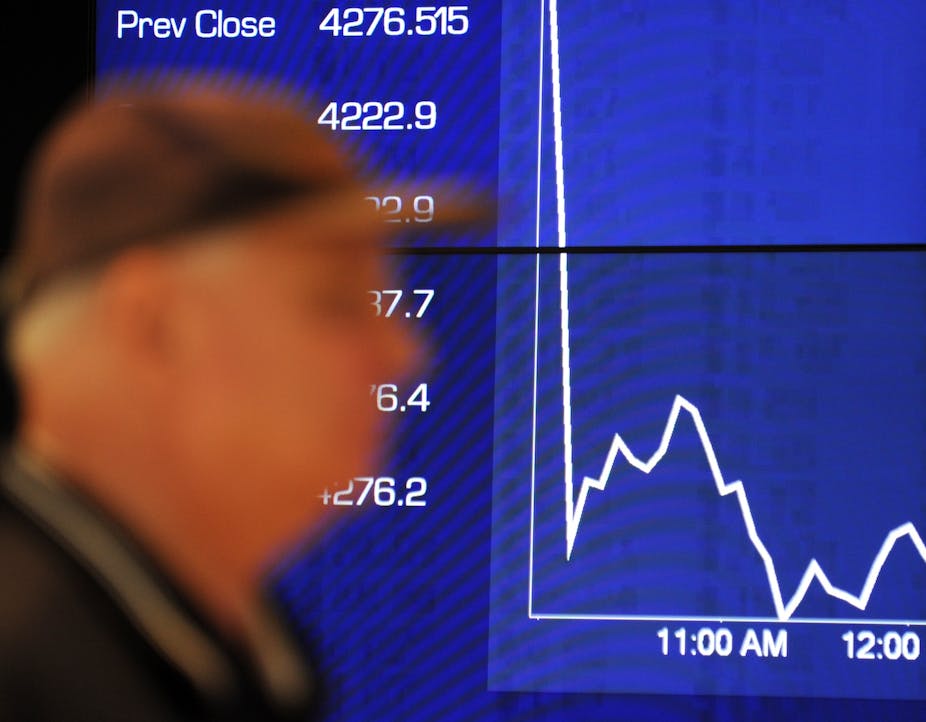The Australian dollar has dropped to a six month low on continuing fears over a Greek exit from the Eurozone, despite pleas from European Union leaders.
Head of discipline, Economics and Winthrop Professor at the University of Western Australia, Ken Clements has written extensively on the currencies of commodity-based exporting countries such as Australia, New Zealand and Canada. He believes the Australian dollar remains over-valued by up to 30% and that an adjustment will happen.
Where do you see the Australian dollar heading from here? Do you see it staying around its current price, or will it continue to depreciate?
The first thing to say about the dollar, about currency values in general, is their volatility. It’s not easy to say where they should be and where they might be headed in the future.
But having said that, my view is that the Australian dollar- notwithstanding the recent depreciation - is still substantially overvalued. I think it’s overvalued simply because prices, pretty much across the board in Australia, are way too high.
In this context, “high” means Australian prices means those as compared to the rest of the world. Anyone who travels inevitably comes back with stories about how things are so much cheaper overseas compared to Australia, whether it’s airfares, industrial equipment, hotel rooms, or even food and clothing.
Things are much, much cheaper overseas and much more expensive in Australia – which means the Australian dollar is overvalued.
Do you see the high dollar as working to help contain inflationary pressures? And when it starts to depreciate – if it is overvalued – will we see inflation (prices) go up even further?
There is a risk that depreciating currencies can form part of an inflationary spiral where prices would go up and up. But in Australia’s case I think that’s a fairly remote possibility. I mean inflation is under control by the Reserve Bank, they’ve been meeting their inflation target of 2-3% and I think they’ll continue to do so. They have sufficient credibility to be able to contain future inflation within that band. So if we had, say, a 20% depreciation of the Australian dollar, I would not see that as being wiped out by a surge in inflation that would just get us back to where we started from.
You’ve written in the past saying – as you just said - that the dollar is overvalued and you think the real value is closer to 75 cents. Do you think it could get there in the near future or is that just a projection of what it is actually worth?
Well, it pays not to be too precise about these things. I have in mind a range of about 75-85 cents for the dollar. That would give rise to a better parity between Australian prices and foreign prices. Now, when that might happen I can’t say.
That’s one of the mysteries of international finance, about how long these things take to adjust. It’s part and parcel of all this volatility in currency markets that make it so difficult to be precise about the timing of these things.
But I would say over the longer term, over a period of a year or more, prices and currency values tend to line up when we look back at the historical experience in Australia and elsewhere. Exchange rates tend to reflect long-term purchasing power parity considerations, which are prices at home relative to prices abroad. But the time taken for exchange rates and prices to adjust seems to be considerable – a surprisingly long period of time. So I can’t really give a killer answer regarding when exactly this is likely to happen.
With the Eurozone crisis and the increasing likelihood of Greece pulling out of the euro, do you think the currency is going to depreciate because of that or do you think that the AAA status of Australian banks will mean that foreign investors flock here as a safe haven and buy the Australian dollar as a safe currency. Which way do you see it going?
Well, I think it could go either way. I think the international investors could equally well move out of the euro and into US dollars again. Historically, the US has been the safe haven for nervous international capital, and I think that’s a possibility again. So if that were to happen and no major form of additional quantitative easing occurred in the US, that would give rise to the opposite of what you were saying.
An appreciation of the US dollar, or a depreciation of the Australian dollar could occur. But this is very uncertain and I think it could go either way.
Is there anything else that you would like to mention?
Possibly house prices. House prices seem to be a long, long way away from currency values but house prices in Australia are expensive relative to those in most comparable countries. Surprisingly, by about the same 20-30% that I claim the Australian dollar is overvalued by. So there could be a hidden link between overvalued house prices in Australia being too high and the Australian dollar being overvalued.

